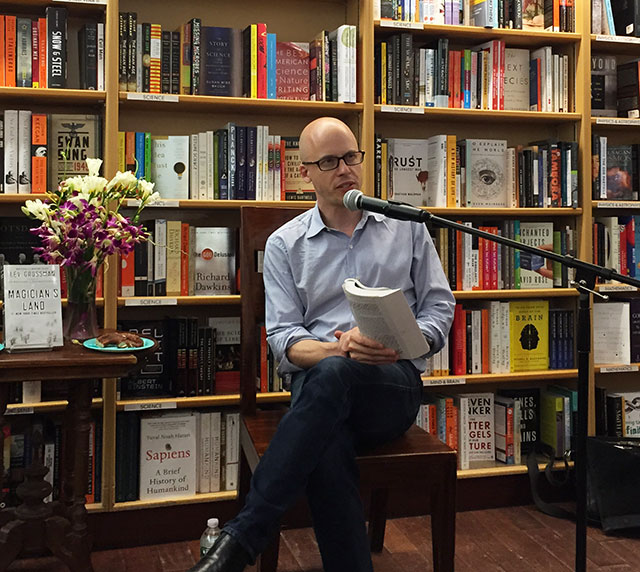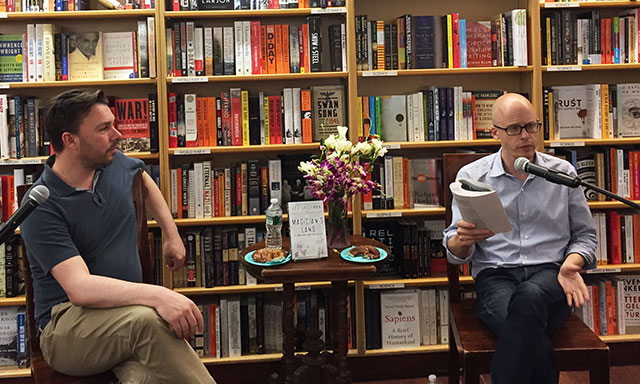
The Magicians trilogy of books has grown into a genre-bending success for author Lev Grossman. Besides spawning a television series, the third book, The Magician’s Land, is now in paperback. Grossman discussed the book and series with Choire Sicha, coproprietor of The Awl and author of Very Recent History.
Sicha is evidently a fan of Grossman’s book fawning over the possibility of unearthing secrets of the book. His knowledge and general demeanor of fantasy and science fiction suggest too that he harbors a soft spot for genre fiction.
“Magic lands are always being invaded,” Grossman says of the third book. The statement offers a kind of summary of what to expect. The Magician’s Land includes a large scale battle, something that was otherwise absent from the other Magicians books.
Fantasy books usually fit into two kinds of categories, Grossman explains. There is the Tolkien aesthetic where everything is epic and large with wide open spaces and grand settings. Alternatively, the aesthetics of Lewis focus on quieter settings, often interiors, and smaller places. For Grossman, he mostly followed the model of intimacy, but knew he wanted at least one large battle.
“A surprising amount of novel writing is ‘I wanted to do X’,” Sicha says.
Grossman says that in the first book, he wanted a talking dragon, but his editor didn’t see how it helped the plot. “What book ever got better when you take the dragon out?” Grossman asks rhetorically. The dragon did make it to the second book.
“We don’t talk about my REAL first novel,” Grossman says when Sicha asks about it. But then they do. Codex took six years to write. Grossman describes it as a down time for him, but it sold modestly. “A lot of people confused it with The Da Vinci Code,” he says, although either because of or in spite of that, it still earned out its advance, a big accomplishment for a first time author.
Grossman says he hadn’t really acknowledged that what he wanted to do was write fantasy books. He ended up reading Jonathan Strange & Mr Norrell and describes the book as having destroyed him. He had never had someone describe magic in the way the book does. Meanwhile, he had been writing something that he described as “formally complicated.” He gave up that project and took a week off from work to start the first Magicians book. He wrote twenty-five thousand words that week.
About this time, Grossman’s twin brother Austin Grossman started writing a novel. Austin Grossman was a game designer by trade and Lev Grossman didn’t feel threatened by his brother’s decision to take up the writing trade: “I always thought he’d dick around forever.” Instead, his brother ended up writing a manuscript that Lev Grossman describes as brilliant.
What followed in The Magicians, the first novel in the trilogy, was Lev Grossman’s determination to outdo his brother. He says that the “sheer rage at seeing your sibling doing something better than you is a powerful motivator.”
Grossman adds that his parents were “literary types” who didn’t value fantasy and genre fiction. “They’re both fancy,” he says, and writing genre fiction had the added benefit that “it could make my parents angry.” Writing genre fiction, he says, was his own form of adolescent rebellion at the age of thirty-five.
The book sold as a literary novel. Grossman never offered it to the traditional science fiction and fantasy publishers, and he thinks that was a benefit when it came to editing. That probably would have changed it significantly, and publishing it as a literary rather than genre novel likely helped it’s broad appeal.
Part of the appeal of the Magicians series is that it plays with conventions of fantasy genre. It was necessary, Grossman believes, to have an audience primed to understand those conventions. From that perspective, the success of the Harry Potter books made it possible for the Magicians to be successful by training an audience that could understand and look at fantasy convention and understand when it was being manipulated. The comic book Watchmen is a kind of model that Grossman looked at. He says that as far as comics goes, it was a hugely transformative book and has lead to the a much darker theme among modern comics.
Eventually someone started calling the first book “Harry Potter for adults.” Grossman says whoever that person was must have been a marketing genius. The moniker stuck. Also helping book sales, Grossman believes, is that he had been a reviewer of books. Book reviewers tend to find it interesting when other book reviewers end up writing books, he says.
“We remember the tiniest slights,” Sicha adds.
As a critic, Grossman knows he has probably slighted some authors.

The series was never intended as a trilogy. “I barely planned to write one book,” Grossman says. But obviously with three books now released, the narrative didn’t end with one. “I felt as though there was more stuff to do.” He also adds that as a child he was obsessed with the idea of returning to Narnia. The Magicians in no way is Narnia, he reassures everyone. But still he was fascinated with the idea of returning to a place.
Critics have taken issue with Grossman’s treatment of women. In particular, some have taken issue with a rape scene. “Its the hardest thing I had to write,” Grossman says, adding he doesn’t even plan on writing another. The reason for it though is significant. The guiding principle, he says, is that there are rules of the universe that he tries to abide by. In mythology, Gods rape mortals. In these tales, it is often presented as normative. He wanted to show it wasn’t. “It should bother readers,” he says.
Grossman is pleased to see the books being adapted to television. He thinks there is way too much plot for movies, but that in television a lot can transpire over a season. He compares it to adaptations of Brideshead Revisited: too much happens for a good movie. Nevertheless, he has little to do with the television show. “Novelists are real control freaks,” he explains, “TV is massively collaborative. I really sort of have to let go of it.”
Now that he has wrapped up the Magicians trilogy, Grossman is working on a new project. He says the problem now though is that he has spent ten years working on the one series. Now he has to learn how to write a novel all over again.
Lev Grossman and Choire Sicha
Tuesday, June 9, 2015
McNally Jackson Books